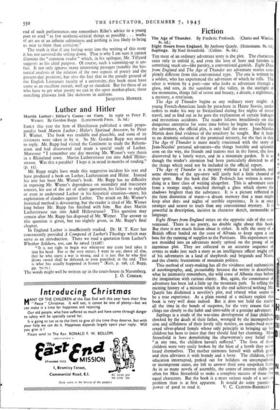Fiction
THE meat of an ordinary adventure story is the plot. The characters exist only to unfold it, and even the love of hero and heroine is something stuck on—like parsley, a conventionaLgarnish. Eight Days from England and The Age of Thunder are adventure stories corn- pleaely different from this conventional type. The one is written by a soldier, who has experienced the adventure of which he tells. The other is written by a poet--one who looks at adventure through a glass, and sees, in the sunshine of the valley, in the starlight of the mountains, things full of terror and beauty, a dream, a nightmare, a mystery, a revelation.
The Age of Thunder begins as any ordinary story might. A young French-American lands by parachute in Haute Savoie, under orders to make his way to Switzerland during five nights of secret travel, and to find out as he goes the explanation of certain leakages and mysterious accidents. The reader follows breathlessly on this dangerous enterprise for some time before he begins to realise that the adventure, the official plot, is only half the story. Jean-Nicolas Martin does find evidence of the treachery he sought. But it leads to no dramatic solution of the promised mystery, for the fact is that The Age of Thunder is more nearly concerned with the story of Jean-Nicolas' personal adventure—the things horrible and splendid seen on the way, the friends and traitors met in the forest, the love discovered by a lonely water, and in a mountain garden. It is as though the reader's attention had been particularly directed to all the things which need not be included in the official report. The Age of Thunder is a mystery without a full solution, and some devotees of the spy-story will justly feel a little cheated of their sport. But the book that Mr. Prokosch has written is some- thing in a finer class of writing altogether. This is adventure seen from a strange angle, watched through a glass which shows the shadows brighter than the substance. It is a picture reflected in the faint distortion of water—a dream memory that a man might keep after days and nights of terrible experience. It is at once stranger and nearer to truth than any conventional mystery. It is powerful in description, incisive in character sketch, memorable in language.
Eight Hours from England strays on the opposite side of the con- ventional. There is no poetry, no double sight about this book. But there is not much fiction about it either. It tells the story of a British officer landed on the coast of Albania to _keep- open a sea base for the running of supplies to the Partisans. His experiences are not moulded into an adventure neatly spitted on the prong of an ingenious plot. They are collected in an accurate sequence of events to make just such a story as an intelligence officer might tell of his adventures in a land of shepherds and brigands and Nazis, and the chaotic frustrations of mountain politics.
This method of story-making has all the vividness and authenticity of autobiography, and, presumably because the writer is describing what he intimately remembers the wild coast of Albania rises before the imagination with curious Clarity. But, again, the connoisseur of adventure has been led a little up the mountain path. In telling the exciting history of a mission which in the end achieved nothing Mr. Quayle has disdained a novelist's plot, and related what seems to be a true experience. As a plain record of a military exploit this book is very well done indeed. But it does not hold the reader all the time in the bonds of suspense, for the very reason that it clings too closely to the habit and time-table of a genuine adventure.
Saplings is a study of the war-time development of four children, shocked by the death of their father, wronged by the incomprehen- sion and selfishness of their lovely silly mother, an under-bred over- sexed silver-plated female whose only principle in bringing up he children has been to insist that they should find her charming. Miss Streatfeild is here demolishing the charwoman's easy belief that "at any rate, the children haven't suffered." The lives of thes children were very easily broken by the blast of a bomb they never heard themselves. The mother torments herself with selfish grief, and then alleviates it with brandy and a lover. The children, their education interrupted, parked out for holidays on unsympathetic or incompetent aunts, are left to answer their own unspoken fears.
As in so many novels of assembly, the centre of interest shifts too often for Miss Streatfeild to make a complete success of these five lel equal characters. But the book is a more serious study of a seriou, problem than is at first apparent. It would do some parents






























 Previous page
Previous page